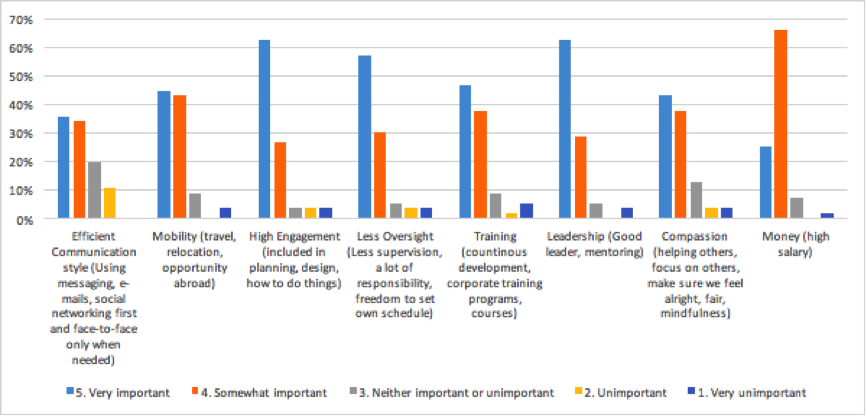This motivates millennials in the workplace
Have you been following my posts about millennials? As I wrote my master thesis about “What motivates early millennials in the workplace?” there has been a series of posts about the topic “Seven Areas of Work Motivation” and “The different types of millennials“.
In order to find out the answer to this question, I’ve been critically reviewing the literature, surveyed early millennial participants from 22 countries with a questionnaire, semi-structured in-depth interviewed 14 participants from 9 countries. This has formed a “triangulation” making it possible to make sense of the data based on three independent sources.
Why bother to understand the motivation of millennials? It adds a strategic value to managers and companies who doesn’t only want a competitive advantage, but wants to manage their employees in a way that goes in line with how they are motivated, thus making them stay, lowering attrition rates and sets the scene for a culture to embrace innovation.
This is contemporary, as 75% of the work force in the world will be millennials by 2025 (Schawbel, 2012).
When I asked 56 millennials about their motivation, this is what they answered:
High engagement, less oversight and leadership comes highest in place for both millennials and generation X. There are no significant differences between the cohorts here. Millennials value efficient communication, mobility and training slightly higher than generation X, who thinks it’s not as important, but still somewhat important. It’s a larger spread on the answers for generation X. (Graph shows millennials only)
Compassion is equally very important for both cohorts. More important than salary, that is only somewhat important for both. This is an interesting finding as it also goes in line with the Herzberg two-factor theory (Herzberg, 1966) and is also supported by later “beliefs” such as “Money is Not The Best Motivator” (Katzenbach and Khan, 2010).
The shorter answer to this question is that the classic holds. Recognition, promotion, salary and work itself does motivate different millennials. The importance here is that there are different types of millennials, which is very important to understand when working with millennials. They seek different things. The first step in order to attempt to answer the question is to get to know the workforce. Who are they, what kind of personalities? Gung-Ho, the company intrapreneurials, those who dares and wants to take risks in order to achieve something greater, they need to be managed very different to Lifestyle, who are a very important company resource in their strong commitment and people skills, the way they bring people together and creates a strong cohesiveness. The Conventional, who are thorough and understands facts. They do it right the first time and they enjoy make sure things move stable. Despite these generalizations, that of course is just an attempt to describe the three typologies on a high level, they do provide a part of the answer to the question. Manage differently, manage individually, this doesn’t only suit millennials but also generation X as well.
Download the entire master thesis “What motivates early millennials in the workplace?” here.
References:
Herzberg, F. (1966). Work and the nature of man. Publisher: Thomas Y. Crowell Co. (January 1, 1969)
Katzenbach, J and Khan, Z. “Money Is Not The Best Motivator”, Forbes Magazine. Available at: http://www.forbes.com/2010/04/06/money-motivation-pay-leadership-managing-employees.html [June 14th 2016]
Schawbel, D (March 29, 2012) “Millennials vs. Baby Boomers: Who Would You Rather Hire?” Time, URL: httphttp://business.time.com/2012/03/29/millennials-vs-baby-boomers-who-would-you-rather-hire/
photo credit: Kompania Piwowarska Lech Browary Wielkopolski in Poznań via photopin (license)

